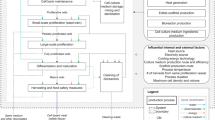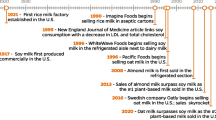Abstract
As part of a larger study eliciting Canadian producer and non-producer views about animal welfare, open-ended, semi-structured interviews were used to explore opinions about animal welfare of 20 Canadian pig producers, most of whom were involved in confinement-based systems. With the exception of the one organic producer, who emphasized the importance of a “natural” life, participants attached overriding importance to biological health and functioning. They saw their efforts as providing pigs with dry, thermally regulated, indoor environments where animals received abundant feed, careful monitoring and where prospective disease outbreaks could be minimized and controlled. Emphasis was also placed on low-stress handling and agreeable working conditions which were believed to promote good animal care. The fact that pigs tend to respond to such conditions with steady growth reinforced the belief that good welfare was provided. Participants supported the use of sow gestation stalls, but with some reservations, and expressed concern about welfare problems that could occur if sows were grouped. Invasive procedures (castration, tail-docking, teeth clipping) were recognized as painful but were accepted because they were seen as: (1) necessary for sales or management; (2) satisfactory trade-offs to prevent worse welfare problems such as injury or infection; or (3) sufficiently short-term to be relatively unimportant. Participants were adamantly opposed to animal neglect and some welcomed actions of animal protectionists that expose poor care. Producers also welcomed natural-science-based approaches to improving animal welfare. The findings contribute to a broader effort to identify overlapping values among different stakeholder groups as a basis for formulating mutually agreeable, farm animal care and handling polices.
Similar content being viewed by others
References
Bock, B. B., & van Huik, M. M. (2007). Animal welfare: The attitudes and behaviour of European pig farmers. British Food Journal, 109, 931–944.
Borgen, S. O., & Skarstad, G. A. (2007). Norwegian pig farmers’ motivations for improving animal welfare. British Food Journal, 109, 891–905.
Centner, T. J. (2010). Limitations on the confinement of food animals in the United States. Journal of Agricultural and Environmental Ethics, 23, 469–486.
Dawkins, M. S. (2004). Using behaviour to assess animal welfare. Animal Welfare, 13, S3–S7.
de Lauwere, C., van Asseldonk, M., van’t Riet, J., de Hoop, J., & ten Pierick, E. (2012). Understanding farmers’ decisions with regard to animal welfare: The case of changing to group housing for pregnant sows. Livestock Science, 143, 151–161.
Driessen, C. (2012). Farmers engaged in deliberative practices: An ethnographic exploration of the mosaic of concerns in livestock agriculture. Journal of Agricultural and Environmental Ethics, 25, 163–179.
Fraser, D. (2006). Animal welfare assurance programs in food production: A framework for assessing the options. Animal Welfare, 15, 93–104.
Fraser, D. (2008a). Understanding animal welfare: The science in its cultural context. Oxford: Wiley-Blackwell.
Fraser, D. (2008b). Animal welfare and the intensification of animal production. In P. B. Thompson (Ed.), The ethics of intensification (pp. 167–189). Heidelberg: Springer.
Fraser, D., Weary, D. M., Pajor, E. A., & Milligan, B. N. (1997). A scientific conception of animal welfare that reflects ethical concerns. Animal Welfare, 6, 187–205.
Friedman, G., & Himmelstein, J. (2006). Resolving conflict together: The understanding-based model of mediation. Journal of Dispute Resolution, 2006, 523–553.
Glaser, B. G., & Strauss, A. L. (1967). The discovery of grounded theory: Strategies for qualitative research. Chicago: Aldine.
Hammersley, M., & Atkinson, P. (2007). Ethnography: Principles in practice (3rd ed.). London: Routledge.
Hemsworth, P. H., Barnett, J. L., Coleman, G. J., & Hansen, C. (1989). A study of the relationships between attitudinal and behavioural profiles of stockpersons and the level of fear of humans and reproductive performance of commercial pigs. Applied Animal Behaviour Science, 23, 301–314.
Hurnik, J. F. (1988). Welfare of farm animals. Applied Animal Behaviour Science, 20, 105–117.
Kauppinen, T., Vainio, A., Valros, A., Rita, H., & Vesala, K. M. (2010). Improving animal welfare: Qualitative and quantitative methodology in the study of farmer’s attitudes. Animal Welfare, 19, 523–536.
Kellogg, J. (2005). My responsibilities as a swine caregiver. Journal of the American Veterinary Medical Association, 226, 1328–1331.
King, G (2006). Pork Production. http://www.aps.uoguelph.ca/~gking/Ag_2350/pork.htm. Accessed 16 Sept 2013.
Kjaernes, U., Bock, B. B., Higgin, M., & Roex, J. (2009). Farm animal welfare within the supply chain: Regulation, agriculture and geography. Welfare Quality ® Report number 8. Cardiff: Cardiff University.
Kling-Eveillard, F., Dockes, A. C., & Souquet, C. (2007). Attitudes of French pig farmers towards animal welfare. British Food Journal, 109, 859–869.
Lusk, J. L., & Norwood, F. B. (2008). A survey to determine public opinion about the ethics and governance of farm animal welfare. Journal of the American Veterinary Medical Association, 233, 1121–1126.
Menghi, A. (2007). Italian pig producers’ attitude toward animal welfare. British Food Journal, 109, 870–878.
Norwood, F. B., Winn, C., Chung, C. J., & Ward, C. E. (2006). Designing a voluntary beef checkoff. Journal of Agricultural and Resource Economics, 31, 74–92.
Novek, J. (2005). Pigs and people: Sociological perspectives on the discipline of nonhuman animals in intensive confinement. Society and Animals, 13, 221–244.
Phillips, C. J. C., Wojciechowska, J., Meng, J., & Cross, N. (2009). Perceptions of the importance of different welfare issues in livestock production. Animal, 3, 1152–1166.
Picard, C. A., & Melchin, K. R. (2007). Insight mediation: A learning-centered mediation model. Negotiation Journal, 23, 35–53.
Roe, B., Sporleder, T. L., & Belleville, B. (2004). Hog producer preferences for marketing contract attributes. American Journal of Agricultural Economics, 86, 115–123.
Sandelowski, M. (2000). Whatever happened to qualitative description? Research in Nursing and Health, 23, 334–340.
Schulz, L. L., & Tonsor, G. T. (2010). Cow-calf producer preferences for voluntary traceability systems. Journal of Agricultural Economics, 61, 138–162.
Spooner, J. M., Schuppli, C. A., & Fraser, D. (2012). Attitudes of Canadian beef producers toward animal welfare. Animal Welfare, 21, 273–283.
Statistics Canada. (2011). Hog Statistics: First Quarter 2011. Catalogue no. 23-101-X. Ottawa: Statistics Canada.
te Velde, H., Aarts, N., & van Woerkum, C. (2002). Dealing with ambivalence: Farmers’ and consumers’ perceptions of animal welfare in livestock breeding. Journal of Agricultural and Environmental Ethics, 15, 203–219.
Tuyttens, F. A. M., Van Gansbeke, S., & Ampe, B. (2011). Survey among Belgian pig producers about the introduction of group housing systems for gestating sows. Journal of Animal Science, 89, 845–855.
Tuyttens, F. A. M., Vanhonacker, F., Van Poucke, E., & Verbeke, W. (2010). Quantitative verification of the correspondence between the welfare quality operational definition of farm animal welfare and the opinion of Flemish farmers, citizens and vegetarians. Livestock Science, 131, 108–114.
Tuyttens, F. A. M., Vanhonacker, F., Verhille, B., De Brabander, D., & Verbeke, W. (2012). Pig producer attitude towards surgical castration of piglets without anaesthesia versus alternative strategies. Research in Veterinary Science, 92, 524–530.
van Huik, M. M., & Bock, B. B. (2007). Attitudes of Dutch pig farmers towards animal welfare. British Food Journal, 109, 879–890.
Vanhonacker, F., Verbeke, W., Van Poucke, E., & Tuyttens, F. A. M. (2008). Do citizens and farmers interpret the concept of farm animal welfare differently? Livestock Science, 116, 126–136.
Webster, A. J. F. (2001). Farm animal welfare: The five freedoms and the free market. Veterinary Journal, 161, 229–237.
Wells, A. E. D., Sneddon, J., Lee, J. A., & Blache, D. (2011). Farmers’ response to societal concerns about farm animal welfare: The case of mulesing. Journal of Agricultural and Environmental Ethics, 24, 645–658.
Woods, A. (2012). Rethinking the history of modern agriculture: British pig production, c.1910–65. Twentieth Century British History, 23, 165–191.
Acknowledgments
Funding for this study was provided by the Social Sciences and Humanities Research Council (SSHRC) and the Animal Welfare Program and its donors. Valuable support and contacts were provided by Dr. Melody Chan, Dr. Egan Brockhoff, Dr. Chris Byra and Catherine Scovil. We also thank Dr. Tim Blackwell, Dr. Harold Gonyou, Dr. Tina Widowski, Bernie Peet, Barb Kosak, Don Davidson, Mark Fynn, Linda Kalof, Lorna Michael Butler and Robert Irwin. We also thank our anonymous reviewers for your valuable comments and suggestions. Special thanks to all participants who cannot be named for reasons of confidentiality but whose openness and warm hospitality made the study an enjoyable as well as an informative experience.
Author information
Authors and Affiliations
Corresponding author
Rights and permissions
About this article
Cite this article
Spooner, J.M., Schuppli, C.A. & Fraser, D. Attitudes of Canadian Pig Producers Toward Animal Welfare. J Agric Environ Ethics 27, 569–589 (2014). https://doi.org/10.1007/s10806-013-9477-4
Accepted:
Published:
Issue Date:
DOI: https://doi.org/10.1007/s10806-013-9477-4




